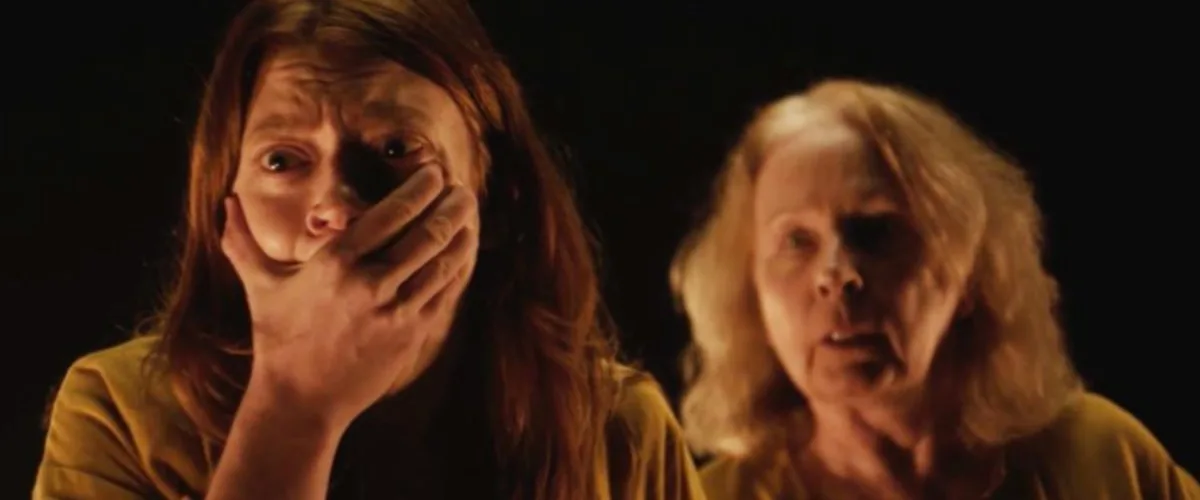There are essentially three paths available to a horror movie like “The Surrender,” about a grieving mother and daughter who try to resurrect a dead loved one. It can be a character-driven drama that’s less conventional and more unusually paced and plotted than you might expect. It can also be a surreal practical/makeup/gore effects showcase, as you might hope given the movie’s unnerving opening image of a pale naked figure, with bone fragments and bloody lesions sticking out of their back, hunched over a human body. That is definitely one way to grab viewers’ attention.
The third way forward, an unsteady straddling of the two other paths, is ultimately the right one for “The Surrender.” The movie’s unexpected conclusion is the clearest indicator that you’re watching an eerie and accomplished gut-muncher that also happens to have grief and mother-daughter trauma on its mind. It’s an unusual combination of moods, but “The Surrender” still charges from one emotional register to the other and back again until it comes to a sudden, but complete stop.
Apart from the movie’s attention-grabbing opening scene, “The Surrender” mostly follows one woman’s struggle to reconcile her memories of her sick father with the version of him that her estranged mother knew. Megan (“The Boys” star Colby Minifie) and her withholding mother Barbara (Kate Burton) try to find common ground during relatively sober dialogue exchanges, which are occasionally interrupted by formulaic (but effective) shock scares. Writer/director Julia Max still mostly focuses on Megan and Barbara’s struggle to connect with each other as they care for Robert (Vaughn Armstrong), Megan’s father and Barbara’s husband.
Robert isn’t long for this world, which doesn’t leave Barbara and Megan much time to reconcile their differences. Then Robert dies. Barbara has retained the services of a mysterious figure (Neil Sandilands) who writer/director Julia Max describes as a “death doula” in the movie’s press notes. Megan understandably appears uncomfortable at the thought of a stranger entering her well-off mother’s home and taking advantage of her grief. Then she turns to her late father for advice on how to deal with her mother’s increasingly disturbed behavior. It’s only a mental projection of Megan’s father, mind you, but he still encourages her with some good common sense—go through with the ritual, and when it doesn’t work, it won’t be your fault anymore.
The ritual does and doesn’t work, but that’s part of what makes “The Surrender” so intriguing. You’d be forgiven for thinking that the movie’s about Megan and her father since so much of the setup concerns what she and her mother should do with his body. Still, the movie’s essential tonal switchups and narrative twists make a lot more sense when you consider the implications of Barbara’s most pointed line. She’s speaking to Megan about her late husband and in a typically direct, plain spoken way: “People save the worst parts of themselves for their spouses.”
Thankfully, Max doesn’t over-extend her high-concept story’s premise, so it’s about two women reconciling their respective views of one man. Instead, once the ritual begins, “The Surrender” subtracts almost every generic element that Max uses to set up her partly contrived plot.
Part of what makes “The Surrender” so refreshing is Max’s consistent focus on her two co-leads’ performances. Minifie sometimes appears underserved by material that encourages her to toggle through variations of the same emotional register (mostly wide-eyed panic). Thankfully, her character’s story eventually lands on a couple of scenes that reveal, in no subtle terms, how deceptively thoughtful the actress’s performance has been throughout. She also has a fine enough foil in Burton, whose stubborn, often unyielding performance can be a different kind of off-putting.
Max holds everything together simply by asking Minifie and Burton to deliver only the lines and sentiments that their characters must stress to get to the next twist of the knife. The ambiguous note she concludes on is a doozy since it drops us in a space where we, like Megan, have to let go of a familiar narrative that ultimately doesn’t match reality as the movie reframes it.
Max skillfully brushes off formulaic expectations and delivers exactly the kind of ambiguous bummer of an ending that this kind of trauma drama deserves. This isn’t just a fun indoor roller coaster—set almost entirely within Robert and Barbara’s home!—but a decent two-hander about reconciling the various competing half-thoughts that squirm to your mind’s surface as you process the sudden death of a long-suffering family member. “The Surrender” accomplishes a lot with a sketch-sized story and matching compositional agility and precision. It’s short (less than 90 minutes!) and sweet and the best kind of upsetting.




















